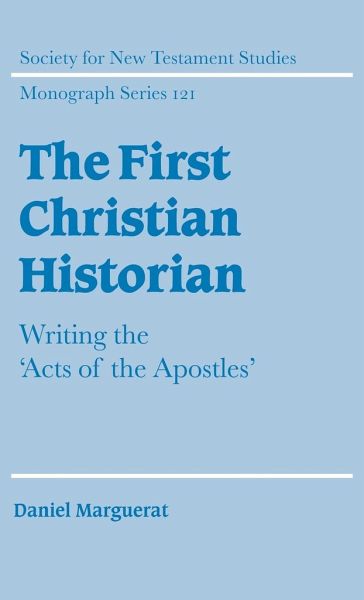
The First Christian Historian
Writing the 'Acts of the Apostles'
Herausgeber: Court, John
Versandkostenfrei!
Versandfertig in 1-2 Wochen
127,99 €
inkl. MwSt.
Weitere Ausgaben:

PAYBACK Punkte
64 °P sammeln!
As the first historian of Christianity, Luke's reliability is vigorously disputed among scholars. The author of the Acts is often accused of being a biased, imprecise, and anti-Jewish historian who created a distorted portrait of Paul. Daniel Marguerat tries to avoid being caught in this true/false quagmire when examining Luke's interpretation of history. Instead he combines different tools - reflection upon historiography, the rules of ancient historians and narrative criticism - to analyse the Acts and gauge the historiographical aims of their author. Marguerat examines the construction of t...
As the first historian of Christianity, Luke's reliability is vigorously disputed among scholars. The author of the Acts is often accused of being a biased, imprecise, and anti-Jewish historian who created a distorted portrait of Paul. Daniel Marguerat tries to avoid being caught in this true/false quagmire when examining Luke's interpretation of history. Instead he combines different tools - reflection upon historiography, the rules of ancient historians and narrative criticism - to analyse the Acts and gauge the historiographical aims of their author. Marguerat examines the construction of the narrative, the framing of the plot and the characterization, and places his evaluation firmly in the framework of ancient historiography, where history reflects tradition and not documentation. This is a fresh and original approach to the classic themes of Lucan theology: Christianity between Jerusalem and Rome, the image of God, the work of the Spirit, the unity of Luke and the Acts.
Table of contents:
1. How Luke wrote history; 2. A narrative of beginnings; 3. The unity of Luke-Acts: the task of reading; 4. A Christianity between Jerusalem and Rome; 5. The God of Acts; 6. The work of the spirit; 7. Jews and Christians in conflict; 8. Ananias and Sapphira (Acts 5.1-11): the original sin; 9. Saul's conversion (Acts 9-22-26); 10. The enigma of the end of Acts (26.16-31); 11. Travels and travelers.
Luke is considered the first historian of Christianity, but his reliability is vigorously disputed among scholars. Daniel Marguerat avoids this true/false quagmire by setting his evaluation of Luke's talent as a historian firmly within the framework of ancient historiography, the rules of ancient historians and narrative criticism.
This book is an original evaluation of Luke's reliability as the first historian of Christianity.
Table of contents:
1. How Luke wrote history; 2. A narrative of beginnings; 3. The unity of Luke-Acts: the task of reading; 4. A Christianity between Jerusalem and Rome; 5. The God of Acts; 6. The work of the spirit; 7. Jews and Christians in conflict; 8. Ananias and Sapphira (Acts 5.1-11): the original sin; 9. Saul's conversion (Acts 9-22-26); 10. The enigma of the end of Acts (26.16-31); 11. Travels and travelers.
Luke is considered the first historian of Christianity, but his reliability is vigorously disputed among scholars. Daniel Marguerat avoids this true/false quagmire by setting his evaluation of Luke's talent as a historian firmly within the framework of ancient historiography, the rules of ancient historians and narrative criticism.
This book is an original evaluation of Luke's reliability as the first historian of Christianity.




